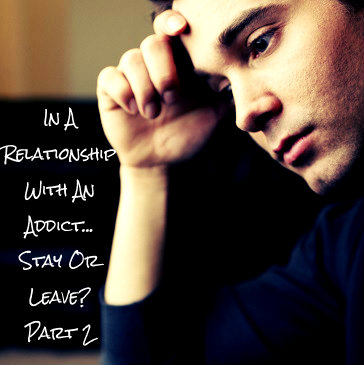Continued From – In A Relationship With An Addict: Stay Or Leave? Part 1
Addressing Codependency Within Yourself
If, through Al-Anon or CODA, you have identified codependent tendencies, it is time to seek help for that problem specifically. A relationship with an addict is never healthy, but neither is a relationship with a codependent. Codependency is a pattern that mimics addiction. If you hope to have healthy, functional relationships in the future, it is imperative that you begin working through this condition.
Ending a cycle of co-dependency is not easy and professional help may be required, as these patterns are usually deeply ingrained and rooted in childhood experience. Learning new, healthy patterns for relationships is not automatic and needs to be addressed intentionally.
Learning To Recognize The Deception And Manipulation Of Your Addict Partner
 How many times has your addict partner blamed you for his or her problems? Or, when you confronted your partner about the addiction, the focus was shifted to you, claiming that if only you were more this or less that, the addicts wouldn’t drink or use in this way? What about all of the excuses of an addict?
How many times has your addict partner blamed you for his or her problems? Or, when you confronted your partner about the addiction, the focus was shifted to you, claiming that if only you were more this or less that, the addicts wouldn’t drink or use in this way? What about all of the excuses of an addict?
Your partner’s addiction is, in no way, related to you or your perceived failings as a partner. Addicts are masters of deception, blame-shifting, excuse-making, and manipulation. Are you falling for it? Do you believe the addict even when you suspect he or she is lying? Do you fail to acknowledge red flags? Part of codependency is smoothing over issues or matters that may cause a fight but should be addressed. Are you allowing yourself to be manipulated?
Recovery May Not Be The Answer For The Relationship
As the non-addict partner, your focus has been on the addict—their needs, their issues, their failings, their protection, and their need to get into recovery. And sometimes the addict does actually pursue recovery, get sober, and join a 12-step community. It seems like this would be the ideal situation.
Not necessarily. Indeed, recovery is always the answer for the addict. There is never a time when it is better to stay in addiction than to get into recovery. But recovery may not be the “answer” for your relationship. The combination of an addict (them) and a non-addict/potentially co-dependent (you) creates a certain relational pattern that, while perhaps not ideal, is familiar. The addict is accustomed to being the screw-up or the authoritarian, and the non-addict is slotted into the role of caregiver, protector and hero.
Recovery changes that. Suddenly the sober addict is bringing a new dynamic to the relationship—taking ownership of their faults, attempting to set proper boundaries, devoting time to recovery and a 12-step community, and seeking the direction of a higher power. This can leave the non-addict in a quandary, not knowing how to act or respond to the sober partner, and not appreciating the shift in roles. Co-dependents get their fix from being rescuers, enablers and controllers. When they are relieved of that role, conflict often results.
Breaking Up With An Addict
A relationship with an addict can never be anything less than toxic. If you are dating rather than married to an addict, the ease with which you can leave the relationship is greater. In the case of marriage where children and a shared home may be involved, other tactics and attempts at recovery should be employed before declaring the marriage over.
For those who are in a dating relationship, the ties with an addict are somewhat easier to sever. While a breakup is always painful, you won’t have the added challenge of a legal battle. The hassle of splitting up possessions or finding a new place to live should not be a deterrent. Freedom and healing is worth that price.
If you fear that your attempts to leave the relationship will be met with violence or other maliciousness, it is wise to involve law enforcement, obtaining a restraining order if necessary. It is also helpful to have the names and phone numbers of shelters in your area where you could stay anonymously for a period of time if necessary.
Listening To Wisdom Of Others And Making A Healthy Decision For Yourself
While the opinions and advice of others need not dictate your life and the decisions you make regarding your relationship, it is often wise to listen to people around you. If your family and close friends are consistently encouraging you to send your partner packing, you may want to take heed. Think they don’t know him like you do, or that they just can’t see the real her? You may be right, but at some point you may need to ask yourself if you are the one who is not seeing the situation in all of its reality.
Whether you decide to stay or leave, you are seeing that not all problems in your relationship are the addict’s. You are gaining awareness of your own faults and perhaps your unrealistic expectations. Only you can decide if this relationship is right for you, but you are gaining the knowledge and understanding to help you make an informed and healthy decision.
Read More About How To Handle A Loved One With An Addiction




















